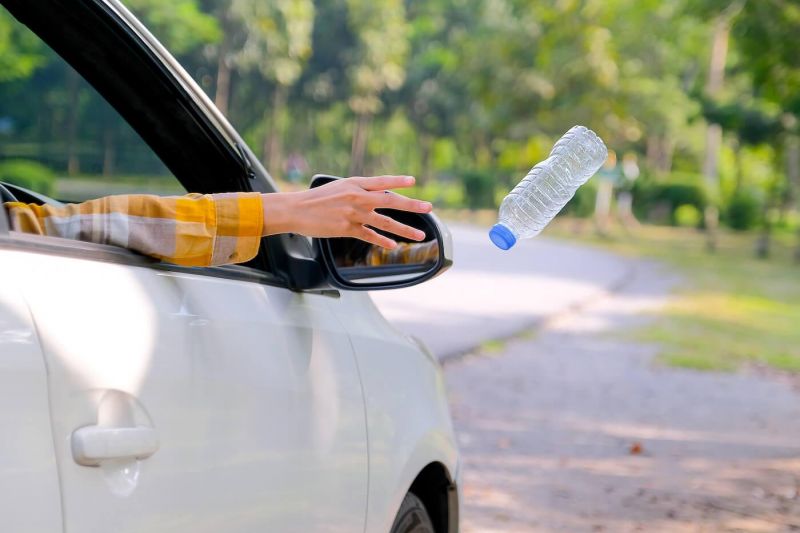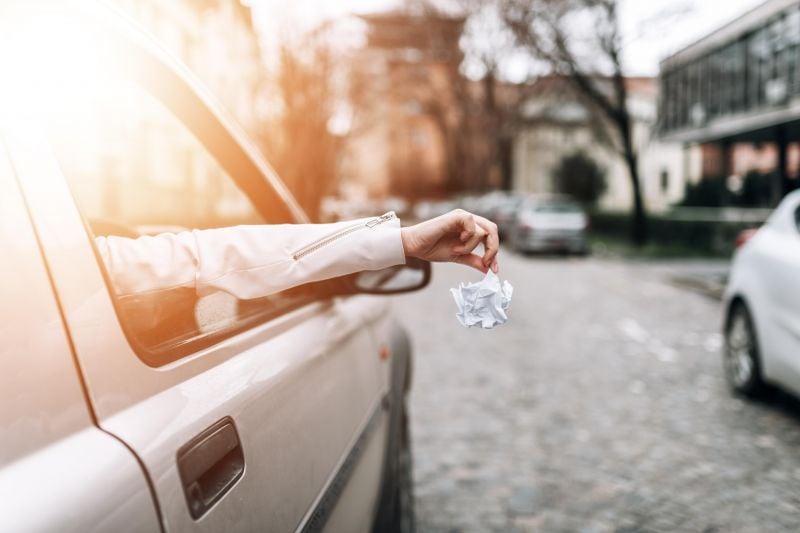Laws across Australia are strict when it comes to littering, with the charge being lead in most jurisdictions by environmental authorities.
- Anything that could be considered rubbish may see you fined for littering
- Even biodegradable items lobbed from your ute could get you in trouble
- Fines can be big, especially if you’re driving a company vehicle
Vehicles are a hot spot for littering. You will likely have seen someone flick a lit cigarette out the window, and those are most noticeable when you’re driving in the dark.
But even throwing things out your car window that are biodegradable – like an apple core or banana peel – could still see you cop a fine. A police officer we spoke to suggested that a driver who was seen throwing any sort of rubbish from their car would cop a ticket if they were caught in the act.
The best advice is to keep your rubbish in your car until you get somewhere that you can put it in a bin. Because no-one wants their piece of fruit to cost them a few pineapples.
And it could even be the case that, if it’s your car but you weren’t driving it at the time, and someone reports the vehicle for littering, that you, the owner, will still have to pay the fine unless you can prove it was someone else who dared to dodge the dustbin.
Here’s a rundown of the rules for littering across Australia:
Victoria
Melbourne’s road rule around litter could be covered by Infringement 2134, according to the 2020-21 Roads Fees and Penalties, which states a $207 fine may apply for the act of “Fail to remove thing dropped from vehicle on road or put on road”.
However, the Environmental Protection Authority (EPA) in Victoria has its own laws, where by fines for an individual could amount to “$370 for a small item of litter such as a cigarette butt or food packaging or $740 for a lit cigarette or other dangerous litter”.
If you dump anything from a work vehicle or while acting on behalf of a corporation, the fine is $1849 for a small item or $3698 for a lit cigarette or other dangerous litter.
South Australia
Adelaide takes a pretty hardline stance on this, too. The City of Adelaide’s residents’ hub states that “people found dumping rubbish or goods can be: issued with an on the spot fine between $210 and $1,000; taken to court and fined maximum penalty from $5,000 to $120,000”.
Further, the state’s Local Nuisance and Litter Control Act (2016) asserts “it is the responsibility is on the owner of a vehicle for an offence committed in association with, or from, a vehicle”, and that it is “up to the owner to declare and prove that someone else was responsible for the offence”.
Queensland
Brisbane’s laws around littering from vehicles (including boats) follows a similar logic to other states.
Individuals and corporations may be fined $200 for “general littering”, such as “throwing a cigarette butt from a car window into the gutter; or food wrappers, bus tickets or food items left on the ground; throwing a soft drink can, takeaway food packaging or plastic bag from a car or boat; or items falling off the back of a ute or trailer due to an uncovered load”. This could max out at $3000 if contested in court.
In QLD, there’s also a bigger fine for “dangerous littering”, which is defined as “any litter that can cause harm to humans, wildlife and property”, such as “broken glass left in
a playground or a lit cigarette in dry grass”. An individual may be fined $400, while a corporation could see that quadrupled. Take it to court and the maximum penalty could be $4000.
New South Wales
In Sydney, the EPA includes littering from vehicles under its scheduled legislation, and the “maximum penalty for the general littering offence is 20 penalty units ($2200)”.
More likely, however, is that there can be penalty notices issued, with Service NSW stating: “Fines from $250 for an individual and $500 for a corporation can be issued from witness reports”.
The state actively encourages residents to dob in dumpers, and they can do so by following these directives:
Get a photo of the car, location and litter item (if you have one) in addition to details about the littering, for example:
- The time you saw it
- Where you were going
- Where you were, in relation to the offender’s vehicle (for example, in your car behind the vehicle)
- Who was with you and if they also saw the littering
- The weather conditions at the time
- How you recorded the littering (for example, in a notebook or voice recording).
Australian Capital Territory
In Canberra there are two different interpretations of the litter rule: for a child, the fine is $75, but adults who do the same act could be fined $186.
Tasmania
Hobart’s rules include an offence known as “deposit single item of litter in a public place”, which may attract a $181 fine. If you see someone littering from their vehicle, you can report it via the Tasmania EPA.
Western Australia
Perth has a few different litter penalties, with higher rates for corporations (in brackets next to the individual fines, below):
- Littering – cigarette butt (not a lit cigarette): $200 ($500)
- Littering – general: $200 ($500)
- Bill Posting: $200 ($500)
- Bill posting on a vehicle: $200 ($500)
- Depositing domestic or commercial waste in a public receptacle: $200 ($500)
- Transporting load inadequately secured: $200 (N/A)
- Littering that creates a public risk – including breaking glass, car parts, tyres, syringes or lit cigarettes: $500 ($2000)
Northern Territory
Darwin doesn’t appear to have a road rule around littering from a car, but there is a Litter Act (1972) that states that “a person shall not leave, throw, deposit or abandon litter in, onto or from a public place or vacant Crown land elsewhere than into an authorised receptacle”. And if they do, they could have the maximum penalty (15 units) imposed which works out to $2430.
Further, however, if the matter made it to court and “in the opinion of the court” the litter in question was “liable to cause injury to, or danger to the health of, a person using the public place or vacant Crown land or damage to property, the court may impose a maximum penalty of 25 penalty units for the offence”, which would mean a $4050 fine.
Not intended as legal advice. Check with the relevant roads authority in your state or territory.





